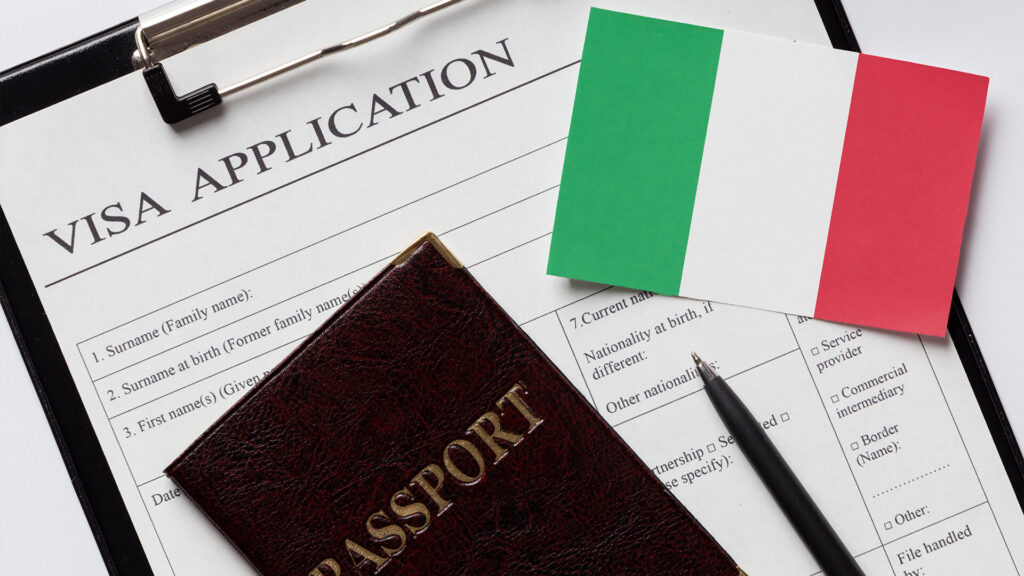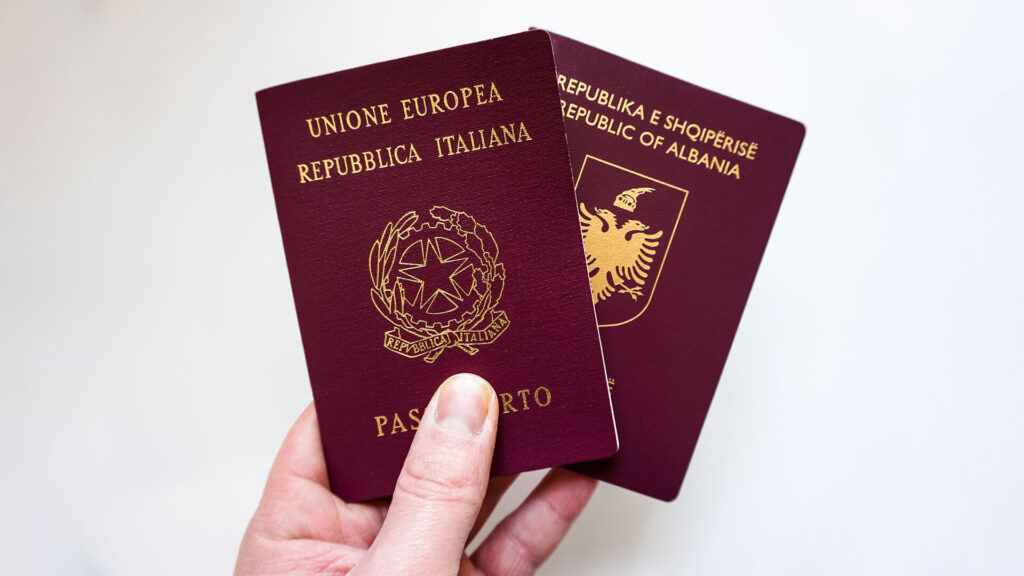Table of Contents

Italian citizenship is not just about getting a passport—it’s about unlocking endless opportunities. From living and working anywhere in the EU to enjoying world-class healthcare, Italian citizenship opens doors. The process takes time, but the reward is worth it. Interested? The key is knowi ng the steps and preparing properly. Let’s see how to become an Italian citizen!
Benefits of Becoming an Italian Citizen
Getting Italian citizenship comes with big perks, but unfortunately, it takes time. It’s worth it because, in the end, you will get lots of freedom, opportunity, and a stronger passport!
Once you’re an Italian citizen, you get:
- The right to live and work anywhere in the EU. It means you don’t need a residence permit!
- Visa-free travel to many countries. Italy has a powerful passport. You can move freely within the Schengen Area and visit 190+ countries without an active Italy visa.
- Voting rights and access to public jobs. You can vote in Italian elections and compete with others in applying for government positions.
How to Get Citizenship in Italy?
Let’s see how to become an Italian citizen! There are several legal ways. Here are the most common:
By Descent (Jure Sanguinis)
If you have Italian parents, grandparents, or even great-grandparents, you might already be eligible! Italy doesn’t have generational limits, but your ancestor must not have given up Italian citizenship before their child was born.
By Marriage
If you’re married to an Italian citizen, you can apply after two years of living in Italy or three years if living abroad. If you have minor children, the wait time is cut in half. You must also pass a B1-level Italian l anguage test.

By Residency
You must live legally in Italy for:
- 4 years if you’re from an EU country
- 10 years if you’re from a non-EU country
- 3 years if you have Italian-born parents or grandparents but didn’t inherit citizenship
- 5 years if you’re stateless or a refugee
By Working for the Italian Government
If you’ve had an Italian work visa and worked for the Italian government or an Italian public institution—even outside Italy—for at least 5 years, you can apply for citizenship. This includes positions in diplomatic services, public administration, and military roles.
Italian Citizenship by Blood
Born in Italy? You Might Qualify – Italy doesn’t give automatic citizenship to those born in the country (unlike the U.S.), but if you’ve lived in Italy since birth and apply before turning 19, you can become a citizen.
Reacquiring Lost Citizenship
If you lost Italian citizenship by becoming a citizen of another country before 1992, you can apply to restore it. Moving back to Italy speeds up the process, as residency-based applications are often approved faster.
Applying for Italian Citizenship
Once you confirm you’re eligible, you can start your Italian citizenship application. The process always includes these steps:

Gather Your Documents
You’ll need:
- Birth, marriage, and death certificates (if applying by descent)
- Proof of residency (if applying through naturalization)
- A clean criminal record
- Apostilles and certified translations for non-Italian documents
Submit Your Application
Where you apply depends on your situation:
- Italian Consulate – If you live outside Italy
- Prefettura (Ministry of Interior Office) – If applying from within Italy
- Local Italian Municipality (Comune) – If claiming citizenship by birth in Italy
Pay the Application Fee
As of 2024, the application fee for Italian citizenship is €300 for most cases. This fee applies to applications based on residency, descent (jure sanguinis), and marriage. Payments must be made through a bank transfer to the Italian Ministry of the Interior, and proof of payment must be included with your application.
Wait for the Processing
Processing times vary:
- By descent: 2–4 years
- By residency: Up to 3 years
- By marriage: Up to 3 years (or 2 if living in Italy)
Note: Take a Language Test (If Required) – If applying through residency or marriage, you must pass a B1-level Italian language test.
Dual Citizenship
Can I get dual citizenship in Italy? Yes, Italy allows dual citizenship, which means you can hold Italian citizenship and another nationality at the same time. But before you celebrate, check your home country’s rules—some nations don’t allow it and may require you to give up your original citizenship.

Why Does Dual Citizenship Matter?
Having two passports comes with big perks:
- Travel freely between both countries
- Vote in both nations’ elections
- Work and study without restrictions
- Access healthcare and social services
How to Become an Italian Dual Citizen?
The process depends on how you qualify for Italian citizenship:
- By descent (Jure Sanguinis) – Gather your ancestor’s birth, marriage, and naturalization records. Apply at an Italian consulate (if abroad) or a Comune (if in Italy). Processing can take 2-4 years.
- By marriage – You must be married for 2 years (if living in Italy) or 3 years (if abroad) before applying. A B1-level Italian language certificate is required. Applications go through the Ministry of the Interior and take up to 3 years.
- By residency – You need 4 years of legal residency (if from the EU) or 10 years (if non-EU). Submit your application online, then finalize it at your local Prefettura.
How to Become an Italian Citizen: Let’s Recap
Italian citizenship isn’t just a legal status—it’s a lifestyle upgrade. From visa-free travel to better job opportunities, the benefits are huge. The process may take time, but the reward lasts a lifetime.
If you want more information and details on how to become an Italian citizen, stop guessing and get a FREE expert visa consultation to make your Italian dream a reality.
FAQs about Becoming an Italian Citizen
It depends on the path you take. Citizenship by descent is usually easier if you can prove your ancestry with the right documents. Citizenship by residency or marriage takes longer and requires meeting strict legal requirements.
The timeline varies. Citizenship by descent can take anywhere from two to four years. If you’re applying through residency, the wait is up to ten years for non-EU citizens and four years for EU citizens. Citizenship by marriage can take up to three years, but if you live in Italy, the wait drops to two.
The government processing fee is €300, but that’s not the only cost. You may also need to pay for document translations, apostilles, and legal assistance, depending on your situation.
You can qualify through ancestry if you have Italian-born ancestors and meet the legal requirements. If you’re married to an Italian citizen, you can apply after two or three years, depending on where you live. Residency-based citizenship requires legal residence in Italy for four to ten years. If you lost Italian citizenship before 1992, you might be able to get it back through reacquisition.
Italian citizenship by descent (Jure Sanguinis) is based on bloodline. If your Italian ancestor didn’t renounce citizenship before their child was born, you may qualify. You’ll need birth, marriage, and naturalization records, all properly translated and legalized. Apply at an Italian consulate (if abroad) or a Comune (if in Italy). The process takes two to four years, but in the end, you get an EU passport and a taste of la dolce vita!
- Author
- Max-B.
- March 13, 2025

Sign Up to Online Course
Related Articles

Understanding the H1B Visa Lottery & Cap for 2025
Every year, far more people apply for an H1B visa than there are spots available. Because of this huge demand,

H1B Visa Stamping in the USA 2025: A How-To Guide
H1B visa stamping in USA means getting a visa stamp in your passport that lets you re-enter the US as

Peru Citizenship Process and Requirements
Peru is a peaceful, affordable, and welcoming country that offers real pathways to citizenship. One way to get Peru citizenship

